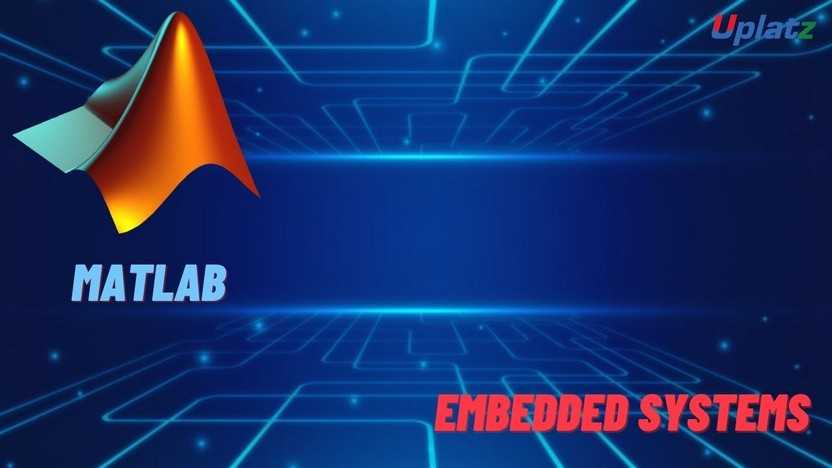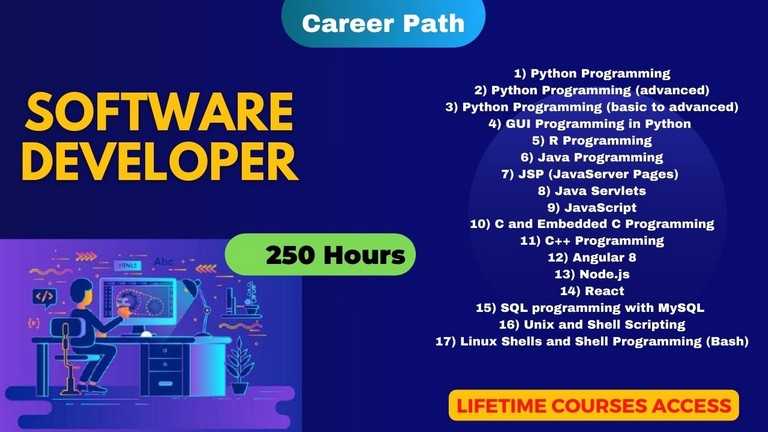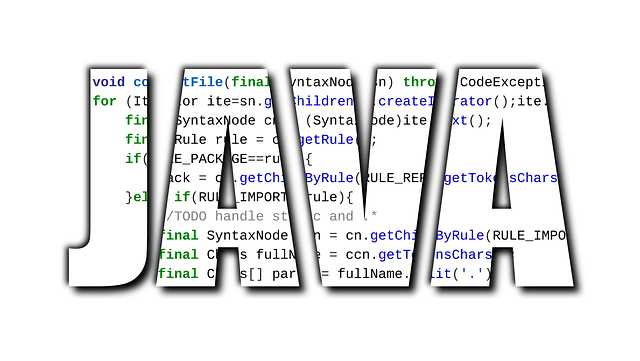C and Embedded C Programming
Learn C & Embedded C. Gain knowledge of syntax and semantics of C and fixed-point arithmetic, named address spaces and basic I/O hardware addressing.Preview C and Embedded C Programming course
Price Match Guarantee Full Lifetime Access Access on any Device Technical Support Secure Checkout Course Completion Certificate 87% Started a new career
BUY THIS COURSE (
87% Started a new career
BUY THIS COURSE (GBP 12 GBP 29 )-
 84% Got a pay increase and promotion
84% Got a pay increase and promotion
Students also bought -
-

- Embedded Systems and MATLAB Programming
- 30 Hours
- GBP 12
- 1501 Learners
-

- Career Path - Software Developer
- 250 Hours
- GBP 32
- 3679 Learners
-

- Java Programming Basics
- 20 Hours
- GBP 12
- 2872 Learners

C is a general-purpose programming language that is commonly used to construct a wide range of desktop apps. Embedded C is a programming language for microcontrollers that is an extension of the C language. The Embedded C language differs from typical C programming in that it supports I/O Hardware Addressing, fixed-point arithmetic operations, accessing address spaces, and other capabilities. Embedded C is unquestionably the most popular language for programming embedded systems among embedded programmers.
An Embedded System is a system that includes both hardware and software and is designed to perform a certain purpose. Embedded systems are made up of both hardware and software components. The Processor is the most important hardware element of a basic Embedded System. Embedded C & the C programming language is taught in the context of embedded systems in C Programming. This course teaches delegates how to programme a contemporary embedded microcontroller utilising real-time development tools, as well as providing them a thorough understanding of the C programming language. The curriculum, examples, and exercises are all tailored to the needs of embedded microcontroller programmers.
Anyone who wants to study or use C in the context of embedded programming or hardware-software interaction will find C Programming& Embedded C to be an outstanding full-strength course. This course is designed for software, firmware, and hardware developers who want to learn how to programme embedded microcontrollers in C. It is appropriate for people who are new to C as well as those who have used C before but have little or no experience with embedded programming in C.
Course/Topic - C and Embedded C Programming - all lectures
-
Lecture 1 - Embedded C - Introduction and Basic Data Types
-
Lecture 2 - C Programming - part 1
-
Lecture 3 - C Programming - part 2
-
Lecture 4 - C Programming - part 3
-
Lecture 5 - C Programming - part 4
-
Lecture 6 - C Programming - part 5
-
Lecture 7 - C Programming - part 6
-
Lecture 8 - Embedded C - Practice 1
-
Lecture 9 - Embedded C - Practice 2
-
Lecture 10 - Embedded C - Preprocessing
-
Lecture 11 - C Traps and Pitfalls - part 1
-
Lecture 12 - C Traps and Pitfalls - part 2
-
Lecture 13 - Secrets of printf in C
-
Lecture 14 - Standard C Library
1).The C language's syntax and semantics for embedded programming
2).The fundamentals of embedded software and real-time programming
3).In this tutorial, you'll learn how to programme an embedded microcontroller in C.
4).A step-by-step guide to using real-time development tools
5).On a target device, how to debug a C programme
6).How to use C to access memory-mapped peripherals
7).In this tutorial, you will learn how to create interrupt handlers in C.
8).Real-time operating systems and scheduling are discussed.
9).An overview of low-power software development
10).Embedded programming best practises
1).Introduction to Embedded C
2).Deep-dive into C Programming
3).Embedded C - Practice
4).Embedded C - Preprocessing
5).C Traps and Pitfalls
6).Secrets of printf in C
7).Standard C Library
The C and Embedded C Programming Certification ensures you know planning, production and measurement techniques needed to stand out from the competition.
C is generally used for desktop computers, while embedded C is for microcontroller based applications. C can use the resources of a desktop PC like memory, OS, etc. While, embedded C has to use the limited resources, such as RAM, ROM, I/Os on an embedded processor.Embedded C is just the extension variant of the C language. This programming language is hardware independent. On the other hand, embedded C language is truly hardware dependent. The compilers in C language are OS dependent.
Embedded C is the most popular programming language in the software field for developing electronic gadgets. Each processor used in electronic systems is associated with embedded software. Embedded C programming plays a key role in performing specific functions by the processor.It performs the same task all the time so there is no need for any hardware changing such as extra memory or space for storage. The hardware cost of embedded c systems is usually so low. Embedded applications are very suitable for industrial purpose.
Uplatz online training guarantees the participants to successfully go through the C and Embedded C ProgrammingCertification provided by Uplatz. Uplatz provides appropriate teaching and expertise training to equip the participants for implementing the learnt concepts in an organization.
Course Completion Certificate will be awarded by Uplatz upon successful completion of the C and Embedded C Programming Online course.
The C and Embedded C Programming Draws an average salary of $130,000 per year depending on their knowledge and hands-on experience.
Embedded engineers are currently in high demand. That means you can expect a more than reasonable salary.
Embedded systems are hard, because in addition to knowing how to program, an embedded systems programmer needs to be comfortable dealing at a low-level with proprietary hardware which is often different from one project to the next.
New trends in embedded electronics will change how electronics are programmed and increase the impact of machine learning in technology. The global embedded systems market will grow exponentially in the coming years, reaching more than $130 billion yearly by 2027.
Note that salaries are generally higher at large companies rather than small ones. Your salary will also differ based on the market you work in.
1).Embedded Systems and Support Engineer.
2).Software Developer.
3).Embedded System Engineer.
Q1. What are the key differences between C and C++?
Answer:1.Paradigm: C is a procedural programming language, while C++ supports both procedural and object-oriented programming.
2.Features: C++ introduces classes, inheritance, and polymorphism, which are not present in C.
3.Standard Libraries: C++ has a richer standard library that includes features like the Standard Template Library (STL), whereas C has a more limited standard library.
4.Memory Management: Both languages offer manual memory management, but C++ provides additional mechanisms like smart pointers to manage memory more safely.
Q2. What is the purpose of the const keyword in C?
Answer: The const keyword is used to declare variables whose value cannot be modified after initialization. It helps in protecting data and ensuring that certain values remain constant throughout the program. Example:
c
Copy code
const int MAX_VALUE = 100;
Here, MAX_VALUE cannot be changed once it is initialized.
Q3.What is Embedded C, and how does it differ from standard C?
Answer: Embedded C is an extension of the C programming language tailored for programming embedded systems. It differs from standard C in several ways:
1.Hardware Access: Embedded C often includes direct access to hardware and peripheral registers.
2.Memory Management: Embedded systems have limited memory, so Embedded C programming must be efficient with memory usage.
3.Real-Time Constraints: Embedded C may need to meet real-time constraints and handle interrupts.
Q4.How do you manage memory in Embedded C?
Answer: Memory management in Embedded C is crucial due to limited resources. Strategies include:
1.Static Allocation: Using fixed-size arrays and variables to avoid dynamic memory allocation.
2.Memory Pooling: Allocating a pool of memory at startup and managing it manually to avoid fragmentation.
3.Avoid Dynamic Allocation: Minimizing or avoiding the use of dynamic memory functions like malloc() and free().
Q5.What is the purpose of the volatile keyword in Embedded C?
Answer: The volatile keyword tells the compiler that a variable’s value can be changed at any time by an external process, such as hardware or an interrupt service routine. This prevents the compiler from optimizing out reads or writes to that variable. Example:
c
Copy code
volatile int counter = 0;
void ISR(void) {
counter++; // Variable modified by an interrupt}
Q6.Explain the concept of Real-Time Operating Systems (RTOS) in embedded systems.
Answer: An RTOS is designed to handle real-time applications where timing is crucial. It provides:
1.Task Scheduling: Manages the execution of multiple tasks with specific timing constraints.
2.Interrupt Handling: Provides efficient handling of interrupts and prioritization.
3.Resource Management: Ensures that system resources like CPU and memory are allocated in a predictable manner.
Q7.How do you debug embedded systems effectively?
Answer: Effective debugging of embedded systems involves:
1.Serial Communication: Using serial ports for logging and debugging output.
2.Debugging Tools: Utilizing hardware debuggers and simulators that allow step-by-step execution and inspection of variables.
3.Breakpoints and Watchpoints: Setting breakpoints to pause execution and watchpoints to monitor changes in specific variables.
4.In-circuit Debugging: Debugging directly on the hardware with tools like JTAG or SWD.
Q8.What is the role of the linker in Embedded C programming?
Answer: The linker combines object files generated by the compiler into a single executable file. In embedded systems, the linker:
1.Allocates Memory: Determines memory addresses for code and data segments.
2.Combines Code: Merges code and data from different modules or libraries.
3.Generates Output: Produces a binary file or hex file that can be loaded onto the embedded system.
Q9.Discuss the importance of watchdog timers in embedded systems.
Answer:Watchdog timers are crucial for ensuring the reliability of embedded systems. They:
1.Monitor System Operation: Watchdog timers reset the system if it becomes unresponsive or enters an infinite loop.
2.Enhance Reliability: Provide a fail-safe mechanism to recover from software malfunctions or hangs.
3.Implementation: Often implemented using hardware timers that require periodic resets from the software.









